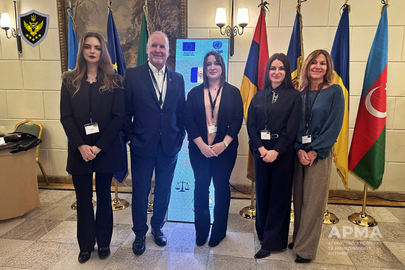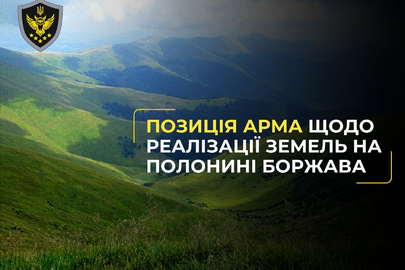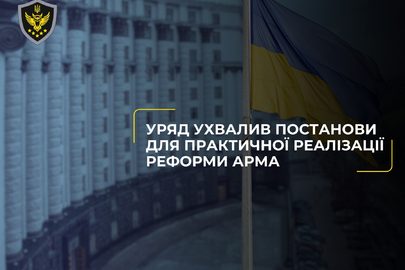Hello, my name is Cornel Călinescu. I'm the head of the Romanian Agency for Tracing and Management of Seized Assets (ANABI). First of all, I want to salute all of you and thank you very much for the invitation to join me here for this event. Also, I would like to congratulate ARMA for stepping up the fight against corruption and for taking the leadership in addressing the issue of asset recovery. We are doing this fight together, and as mentioned, you cannot do this alone. The fact that we are present here shows you're not alone; you have good neighbors, you have good partners, and I hope you have good friends also.
I will take the opportunity to share with you a little bit of what we are doing, with a few disclaimers, because usually, I'm having this presentation around many countries, and everybody wants to copy or replicate. The first advice that I'm giving to everybody that is interested in this area of recoveries: do not just copy; find your own model. Take the best out of the things that you see around and replicate it, adapting it to your own legal system.
What we have learned when we started the work in recovery was the fact that everybody was expecting magic; everybody was expecting things to happen overnight, and usually, there was one entity, one institution, that was to blame for everything. What we are trying to do in Romania is to explain to everybody—members of government, members of parliament, civil society—is that we can either lose it all or we can win it all. So, the idea is to have an integrated approach, to involve all the stakeholders that are involved in fighting crime, but also the ones that should be benefited from the procedure of crime.
Here about, so what we have developed is what I like to say about our agency in Romania: a One-Stop Shop, a place where each stakeholder comes to receive service, to receive training, to receive guidelines, to receive support. So, I will share with you a few of the things that we are doing, but again, with a big disclaimer: do not copy blindly. Listen, see, and if it's good for you, use it; if it's not, check for some other things, because this is an evolution. We are learning every day, we are changing every day, we'll have to change the law again and again because criminals are evolving. We have to catch up to them and have the tools at hand.
It will be also easy for you, after seeing this report, to understand that we are doing some things that are part of the integrated approach at your level and international. So, as ARMA is doing, we are also facing and by being connected to a hub of specialists throughout the world, we can reach almost each jurisdiction in very few minutes, hours. For example, if a case happens today in Ukraine and it has a link with Romania, ARMA will contact, on the same day, a prosecutor from Romania. A prosecutor from Romania will be in contact with the prosecutor in Ukraine. This is the advantage of having a network, but it's also an advantage of having good partnerships and having good connections.
This is why it's important that your agency, our agency, are part of this big family of specialists. I'm not only present here in my capacity as director of the agency; I'm also a member of the steering group of CARIN, and usually, CARIN is the best platform for offering you access to very what we do. And it's new for many other countries is the fact that we don't stop once we have a final decision, and this is something that we all have to consider."
The text provided needs proper punctuation, capitalization, and some adjustments for clarity. Here is a corrected version:
"We are also tracing post-conviction in many of the criminal cases. You obtain a decision, you have a threshold confiscation order with millions and hundreds of millions, and the recovery rate is usually low. It's important that you don't stop, and you have the power given to the agency in charge of asset recovery to continue tracing even post-conviction. It was mentioned about the developments of criminals in the AI area. Yes, unfortunately, they are so advanced and they use, especially cryptocurrencies, to hide the profits of crime. For our region, the amounts are beyond hundreds of billions that are traveling through exchangers, and now exchangers. This is why you need to find not a lot, but the best experts that you may have under your roof, to trace, seize, and sell cryptocurrency. We have reached this conclusion. We have dealt with crypto cases for the last five years, and unfortunately, these types of specialists are very rare. So, you have to invest in your resources, and usually, this means creating a specialized task force. All the big agencies that we are working with have this type of task force, but they need to have the best resources available: equipment, software, and of course, training, certifications, and so forth.
We also manage, and when we introduced this in Romania, this was a new thing. Nobody paid attention to management. What we did for really high-value assets, this means €50,000 for individual assets or €300,000 for company stocks. For us, the best way of managing criminal assets is to sell them. Again, it was a problem of mentality. Introducing this into our legislation was seen as revolutionary. For some of our members of the public, it was seen as an abuse, as something that you shouldn't do. But this is the way ahead. So, we don't spend public funds. We go ahead and convince the judge that the best way of managing is to sell, and we do this prior to a final decision.
After introducing participation to our auctions, everything is transparent, everything is monitored, and you manage to secure a huge participation in the auction. About 10% to 15% of those are coming from overseas. This expands the number of participants and also raises the rate of return. We have put together this system too. It's a system that brings together all the stakeholders. At the moment, 15,000 participants, and the target is to reach 70,000. All police, all prosecutors, all courts, and administrative structures that are involved are feeding up the information into this system. And the agency currently holds data from more than 70,000 court decisions regarding assets. Because this is again evolution, this is relevant for the anti-corruption experts. The value of having this system in place is very high, and we have demonstrated in many situations that actually, our approach not only is effective, but our time is well spent implementing it."
"So, we are under pressure. The public is asking to increase our numbers, to increase our performance, and actually, the government agreed that we receive resources, but only if we manage to increase our performance by 50%. So, it's very pragmatic, objective, and it's putting a lot of pressure on us, but also on all the stakeholders involved. Again, you cannot succeed alone. This is why we need to have good cooperation with the police, with prosecutors, to have strong legal basis for your actions in front of the court, and not to stop once you have a decision. I really advise for this post-conviction tracing and management, together with police and prosecutors, to develop tools, guidelines. We have reached the level of even creating apps because nobody reads manuals and books anymore. So, in Romania, the police and prosecutors are having the guidelines in the applications developed, creating the practice, creating checklists, and creating quick access to information.
We are not alone in the regulation that is available at your level, and we are ready to put at your disposal the access to confiscation of proceeds of crime, which is built on the idea of direct communication: prosecutor to prosecutor, judge to judge, and from abroad. It's important that you reach a decision, you reach a confiscation order, and then, this is very important, that you have your authorities ready to negotiate and to fight for those percentages. The rule internationally is 50% to 50% because we are assuming we are all fighting for the same goal, and we have invested equally in tracing and recovering criminal assets. But I recommend that you pay a lot of attention to this topic because it will come into your practice, that you need a dedicated body, and I think, in my mind, that ARMA be the one to deal with it, that advocates for increasing those 50% on the advantage of the jurisdiction. We have done this; we have managed to secure 100%, 75%, but this is also because you have all the arguments in your files, and you need to act as a good manager so that you can convince your partners that your role in that case was more important.
We are also involved in what happens after the cases are finalized. Again, for us, it's an integrative approach. We deal with all assets from the beginning until the end, and for us, the best way to show to the public what happens with the criminal assets is to return them to the society. This is why we have decided in 2022 that half of what is confiscated returns to crime prevention, education, and victim protection. This is a scheme that is now evaluated by many other jurisdictions, but I think this is the best way to show to your public what you are really doing.
For instance, this year we have launched, for the first time, the first movement program for NGOs. We're actually acting as a Management Authority. We have competitions for civil society that applies for funds from confiscations, and with these funds, they implement projects, mainly focused on dealing with victims.
Again, integrated approach, one-stop shop. We also provide government and Parliament with the fundamentals for policy reform. We are the policy depository in asset recovery. We have promoted a strategy that is now implemented, 2021-2025."
"We're already predicting the next five years that will come in this area, but again, it's the advantage of having the entity that has the most information about the subject dealing with the process. We have managed to gather at our table police, prosecutors, fiscal authorities, NGOs, mass media—everybody that is concerned about the topic—and everything then is mapped into this policy that it's implemented. We don't deal only nationally because we take a lot of pride in what we are doing. We have pushed a lot at the EU level for giving to the asset recovery offices the legal instruments to deal with the process. Surprisingly or not, even today, asset recovery offices do not have a strong legal base at the EU level. We're acting based on a council decision from years ago, and actually, the new directive that we are involved in drafting will provide all asset recovery offices in the EU with access to databases, expertise, and introducing these mechanisms for management.
It's important for you to know that, at this moment in the EU, only seven jurisdictions are actually doing what we are discussing here in the later sales. There are only seven countries included that are doing this. This was new, and this is relevant for the anti-corruption experts in the room. We have fought a lot for introducing non-conviction based confiscation and civil law tools because usually the burden of proof in criminal cases is very high, and we have reached many situations where justice is not done, and our slogan, 'Crime does not pay,' is not really implemented. So, we have advocated for these tools to be introduced into the directive, and I'm really looking forward that Ukraine will implement those provisions too because we need them in our practice.
The same, our agency is involved now in the development of the second protocol to the war convention. So, as you see, these are tools that are developing now, and it's important that your specialists, your experts, are also involved in this process.
We are under pressure. The public is asking to increase our numbers, to increase our performance, and actually, the government agreed that we receive resources but only if we manage to increase our performance by 50%. So, it's very pragmatic, its objective, and it's putting a lot of pressure on us but also on all the stakeholders. Again, you cannot succeed alone. This is why you need to have good cooperation with the police, with prosecutors, to have a strong legal basis for your actions in front of the court, and not to stop once you have a decision. I really advise for this post-conviction tracing and management.
It's also important to return the expertise that you have to the practitioners, and this is one of the core mandates of asset recovery agencies. We are doing this on a daily basis. We are working together with police and prosecutors to develop tools, guidelines, manuals. We have reached the level of even creating apps because nobody reads manuals and books anymore. So, in Romania, the police and prosecutors are having the guidelines in the applications developed in an iOS and Android system. I recommend this for you because again, it's about creating the practice, creating checklists, and creating quick access to information.
We are not alone, and we are part of three major constructions that are working now to impact the regulation that is available at the EU level."
"And we are ready to put at your disposal the access to the information we have collected, so the practice of all EU member states in implementing the regulation on seizure and confiscation of proceeds of crime, which is built on the idea of direct communication: prosecutor to prosecutor, judge to judge, and direct recognition of the seizing orders and confiscation orders. We have also developed a tool that, based on the information that I had, also supported a lot of your activities. And I'm talking here about our projects. We are part of this consortium together with academia, together with the best agencies in asset recovery in Europe, Europol, Eurojust, and we have developed a global database collecting all the information available on trade registers, beneficial owners, and so forth.
In 2022, the first mapping exercise was done together with Transcrime, and this fed into OSCAR operations, operation, and also on the ongoing cases done by Europol and all the agencies that are working on those cases. We are also available for providing you with access to this system and to save it into your ongoing cases.
My presentation was brief. I want to keep it brief, but I wanted you to have a checklist of things that we are doing and things that you can consider in working with us. And I return to my opening line, saying thank you for the invitation. It's good to see ARMA being active, it's good to see ARMA being able to gather such a great audience for this report. We are already at the second meeting, and I think we have a habit to meet quite often as we're working with our partners in Kiev to have a bilateral, strong partnership. I hope, sometime soon this year, we will see your team here or nearby for continuing our work. Thank you very much."


